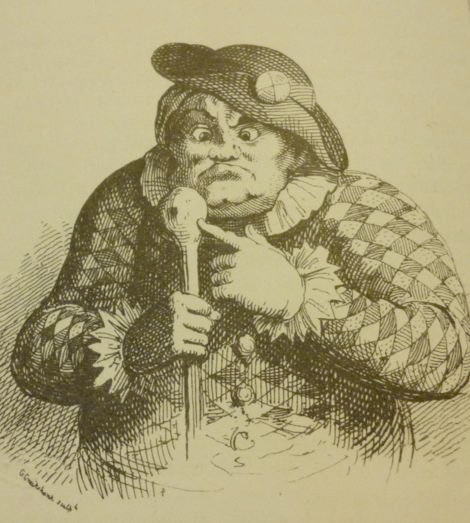“Died last week, at her lodgings, near the Seven Dials, the much-talked of Mrs. Mapps, the bone-setter, so miserably poor, that the parish was obliged to bury her.” London Daily Post, 22nd December 1737.
Mrs Sarah Mapp had a brief flirtation with fame in the mid 1730s when her pioneering work in what might now be called physiotherapy or osteopathy found favour with society.

She set up in the spa town of Epsom near London and soon had the gentry queuing up to watch her operations and give her money. Though she was untrained except by apprenticeship to her father, (who was a bone setter too), her cures were said to be “effected more by boldness and personal strength than skill”. Nevertheless cures there were. Said one observer: “she operated successfully upon a niece of Sir Hans Sloane. The same day, she straightened the body of a man whose back had stuck out two inches for nine years; and a gentleman who went into the house with one shoe-heel six inches high, came out again cured of a lameness of twenty years’ standing, and with both his legs of equal length.”
In her day she was rich enough to drive from Epsom into London in her own extravagant carriage drawn by four horses, for consultations and treatments in a coffee house off the Strand. Her coach went at a speed few others would chance, given the state of the roads. Mrs Mapp was once mistaken on the Old Kent Road by the London mob for the notorious mistress of George I, the Duchess of Kendall. Hearing the crowd shouting after her that she was ‘a Hanover whore’, she finally let down her window and bellowed back that she was no Hanover whore, she was an English one.
Sarah’s short-lived marriage was spectacularly less successful than her sister’s. Her sister was an actress known professionally as Maria Warren and who had stepped into the part of Polly Peachum in The Beggar’s Opera when former child prostitute and starlet Lavinia Fenton quit to become the Duchess of Bolton. Sister Maria had a superfluity of husbands — she only escaped a bigamy charge when her clever lawyer read out the relevant Act of Parliament in court. For the omission of the word ‘husband’ in the Act, it seemed that men could not marry twice, but that women could, according to the law.
Sarah’s marriage ended abruptly: “Mrs. Mapp. always successful in her cures, has not been happy in the choice of a husband, he not only forsook her, but stripped her of her money and what adds greatly, to his guilt, ’tis assured he has another wife living, with two children.”
A bit more detail comes from the satirical weekly, the Grub Street Journal in 1736: “We hear that the husband of Mrs. Mapp, the famous bone-setter at Epsom, ran away from her last week, taking with him upwards of a hundred guineas, and such other portable things as lay next to his hand. Several letters from Epsom mention that the footman, whom the fair bone-setter married the week before, had taken a sudden journey from thence with what money his wife had earned; and that her concern at first was very great, but as soon as the surprise was over, she grew gay; and seems to think the money well disposed of, as it was like to rid her of a husband.”
In 1736 she was performing high society operations in front of Queen Caroline in Hampton Court; being invited to hear a song about herself in a new play; guest of honour at the dissection of a recently hanged thief and notorious jail breaker Daniel Malden and by the following Christmas she was in a pauper’s grave.
